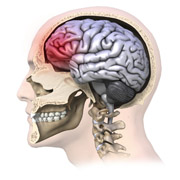Research and Innovation, UNL Office of

Center for Brain, Biology, and Behavior: Faculty Publications
Document Type
Article
Date of this Version
2017
Citation
International Journal of Exercise Science 10(5): 690-701, 2017.
Abstract
High levels of endurance training have been associated with potentially negative health outcomes and addictive-like symptoms such as exercise in the presence of injury and higher levels of impulsivity. This pilot study examined the relationships among self-report measures of addictive symptoms related to exercise and behavioral and neural measures of impulsivity in endurance runners. We hypothesized endurance runners would have increased preference for immediate rewards and greater activation of cognitive control regions when making decisions involving delayed rewards. Twenty endurance runners (at least 20 miles/week) were recruited to undergo measures of self-report exercise addiction symptoms, impulsive decision-making (delay discounting) and functional magnetic resonance imaging (fMRI). During behavioral and fMRI examinations, participants chose between a small hypothetical amount of money given immediately ($0 – 100) compared to a larger hypothetical amount of money ($100) given after a delay (2-12 weeks). On half of the trials participants were instructed that if they chose the delayed reward they would not be able to exercise during the delay period. Eighteen participants were included in the analysis. Results indicated that 94% of endurance runners reported high levels of exercise addiction symptoms, and 44% were “at-risk” for exercise addiction. In addition, endurance runners demonstrated increased preference for immediately available compared to delayed rewards (p < 0.001) and greater recruitment of cognitive control regions (dorsomedial prefrontal cortex and anterior cingulate) when making decisions involving rewards when exercise was delayed (p < 0.05). Together, these results indicate that endurance runners not only report addictive symptoms related to exercise, but also demonstrate addictive-like behaviors.
Included in
Behavior and Behavior Mechanisms Commons, Nervous System Commons, Other Analytical, Diagnostic and Therapeutic Techniques and Equipment Commons, Other Neuroscience and Neurobiology Commons, Other Psychiatry and Psychology Commons, Rehabilitation and Therapy Commons, Sports Sciences Commons

